‘Walking a tightrope’: Calvin’s complicated stance on LGBTQ+ issues has caused problems for decades

In the past two years, LGBTQ+ issues have been a topic of heated debate at Calvin, but the university’s policies on same-sex marriage have been causing difficulties for students and employees on both sides of the debate for far longer.
When Jan Simonson married her partner in 2012, she was euphoric. The former Calvin professor recalled feeling like she “was in seventh heaven” going for walks and holding hands in public with her new wife.
At the time, same-sex marriage was still illegal in the state of Michigan, so the couple traveled to New York for their wedding ceremony. Still, Simonson said public rejection and consequences were the last things on her mind. Just four years earlier, she had earned tenure in Calvin’s education department, and her career was flourishing. Between the woman and the job she loved, it seemed like Simonson’s world couldn’t get any better.
Then, in late 2013, she was called into the provost’s office for a meeting.
“I never thought I’d be judged. I thought that people who knew me, they’d know me and love me, and if they thought I was doing something wrong, they would pray for me,” Simonson told Chimes. “So, I was probably a bit too loose-lipped. I must’ve told the wrong people, and that’s how it came back [to the provost].”
According to Simonson, then-provost Claudia Beversluis and Calvin’s director of human resources asked if she was in a relationship with another woman. Having heard rumors of employees in same-sex marriages being fired from Calvin in the past, Simonson declined to answer and sought the advice of a lawyer.
“[The lawyer] said that Michigan did not have sexual orientation as part of its civil rights, and if we came against it, we couldn’t win. The best we could do was get a severance package,” Simonson said.
In their next meeting, Simonson answered the provost’s questions honestly: Yes, she was married to another woman; No, she was not aware that same-sex marriages were in direct violation of Calvin’s faculty handbook, which defines sexual misconduct as any sexual activity outside of a heterosexual marriage.
As Simonson recalls it, that was that. The provost informed her that she could no longer be employed at Calvin – a place she loved deeply.
Simonson was neither the first nor the last employee to be adversely affected by Calvin’s policies against same-sex marriage. Since reporting that Calvin was parting ways with its Center for Social Research in part because of an employee in a same-sex marriage, Chimes has learned of at least three instances in the past two decades where employees were fired under similar circumstances.
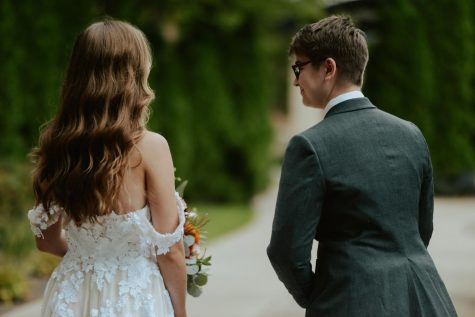
Though the university often uses confidentiality agreements to keep private the reasons behind controversial firing decisions, officials don’t deny that such decisions have been made.
“Calvin has previously made decisions about hiring and continued employment based on our policy prohibiting sexual relations outside of marriage between one man and one woman. Employee decisions to engage in sexual relations that violate this policy, whether in heterosexual or homosexual relationships, have resulted in separations from the university,” Provost Noah Toly said in an email to Chimes on March 11.
Two years after Simonson was fired, the U.S. Supreme Court legalized same-sex marriage in all 50 states. The landmark decision in Obergefell v. Hodges on June 26, 2015 marked the culmination of a decades-long battle for equality; however, same-sex marriage didn’t gain popular support in the U.S. until just four years before it was legalized. According to Gallup polling on American values and beliefs, 2011 was the first year in which a majority of Americans supported the legalization of same-sex marriage.
As opinions on homosexuality shifted in the U.S. more broadly through the early 2000s, debates also took center stage on Calvin’s campus and in the Christian Reformed Church — the denomination with which the university is affiliated. In the past two decades, Calvin’s traditional views on same-sex marriage have resulted in the firings of multiple employees, created tense relationships with external organizations, and at times threatened the academic freedom of students and faculty.
The current CRC position on homosexuality was established in 1973. Often summarized as “love the sinner, hate the sin,” the 1973 stance does not consider homosexual orientation a sin but sees homosexual actions as “incompatible with obedience to the will of God as revealed in scripture,” according to a position summary on the denomination’s website.
In 2016, the CRC synod established a study committee to articulate the denomination’s interpretation of biblical teachings on human sexuality. The resulting Human Sexuality Report, released in October 2020, declared that “the church’s teaching against sexual immorality, including homosexual sex, already has confessional status.” The report will go before Synod 2022 this summer, where members will vote on whether to adopt it.
In response, nearly 150 Calvin professors signed a letter disagreeing with the report, stating that declaring the CRC’s stance against homosexual relationships as confessional would endanger academic freedom.
Their letter to University President Michael Le Roy and Calvin’s Confessional Commitments and Academic Freedom committee, sent on Dec. 10, 2020, reads in part:
“Adoption of the report’s claims regarding confessional status would cause harm to our Reformed community by severely impairing staff and faculty’s ability to care for our LGBTQ students in the way that our conscience dictates and the scholarship supports. While staff are not required to sign the Covenant for Faculty Members, some would consider working for an institution for whom the report was afforded confessional status a violation of conscience.”
Disagreement with the report doesn’t end at academic freedom. All members of Calvin’s faculty are required to sign the Covenant for Faculty Members, which assents to the confessional beliefs of the CRC. If Synod 2022 declares the CRC stance on human sexuality already confessional, it could retroactively signify agreement with a stance against same-sex marriage. A strong contingent of Calvin’s faculty affirms same-sex marriage. Others who signed the letter side with the CRC stance but see confessional status as a step too far.
Calvin currently allows faculty the academic freedom to question and debate the CRC’s stance on homosexuality in their teaching and writing, but that freedom hasn’t always been a given. In 2009, after theater professor Stephanie Sandberg wrote and produced a play that presented the true stories of seven gay Christians, the board of trustees issued a memo telling faculty that it was “unacceptable” to teach, write or advocate on behalf of same-sex relationships.
Sandberg initially wrote the controversial play, “Seven Passages,” after the parents of one of her students pulled him out of Calvin and placed him in therapy for coming out as gay. Sandberg told Chimes she was left in disbelief that there was still so much work to be done for the church to understand its LGBTQ+ members.
“I had so much support from the Calvin community. Faculty were, as a whole, very supportive. Many, many people came to see the play and participate in discussions,” Sandberg said. “It was literally a narrow faction of people led by President Gaylen Byker who really disliked what I did and tried to accuse me of unorthodoxy.”
Calvin’s Faculty Senate fought back against the memo, voting 36-4 to ask the board to withdraw its statement.
Sandberg was eventually laid off in 2015 for reasons unrelated to “Seven Passages.” Due to financial strain, Calvin cut several arts professors alongside her. She now teaches at Washington and Lee University in Virginia, where she says she’s been able to be more inclusive in her work.
Although Calvin’s current policies are more open to academic freedom than they were when she was on campus, Sandberg doesn’t think the university is truly welcoming to LGBTQ+ students or employees. “It’s a very different world that I’m in now, and I feel like since I’ve left Calvin, the church and the institution have taken steps backwards from inclusiveness. I could not work there any longer. If I hadn’t been downsized, I would’ve had to leave,” she said.
In the years after the 2009 board of trustees memo, the Homosexuality and Community Life working group, a board-mandated committee established in 2008, published three consecutive documents examining the intersection of homosexuality and academic freedom. The final document, Homosexuality and the Calvin Community, or HCL 3 as it’s more commonly referred to, was sent to the board in May 2012. It has since served as the go-to articulation of Calvin’s position on LGBTQ+ issues.
HCL 3 strongly advocates for academic freedom while adhering to the CRC stance on same-sex marriage. When teaching directly on issues related to homosexuality, HCL 3 instructs professors to honor and give the CRC’s position fair treatment and to acknowledge “fairly and honestly that Christians disagree on this topic and that people of good conscience and a high view of Scripture and the confessions hold differing views.” The document also provides extensive guidelines for faculty scholarship relating to homosexuality.
For philosophy professor David Hoekema, a member of the HCL working group, the formulation of HCL 3 was far from the first time he’d had to seriously consider and defend the CRC’s policies on homosexuality.
In 1998, at a meeting of the American Philosophical Association, Hoekema was put in the awkward position of defending Calvin’s policies against homosexuality as other members of the APA moved to include sexual orientation and behavior in the protections of their nondiscrimination policy. Hoekema himself thought Calvin’s stance was largely outdated.
Just a few years earlier, he had grappled with his personal beliefs on homosexuality when his own daughter came out as lesbian.
“It was kind of a challenge for me. In theory, I wanted to be very open to LGBTQ people. Emotionally, it was kind of difficult, but it became clear this is who she was,” Hoekema said.
Despite his own affirming beliefs, he had to fight on behalf of Calvin’s stance so that the institution could remain a member of the APA. In the end, though, the proposal was adopted. Calvin and numerous other religious institutions were barred from participating in APA programs.
“I was fighting very hard to protect a policy that I really hoped would change,” Hoekema told Chimes.
Though Calvin’s policy still has not changed, the retired philosophy professor said he watched opinions and debates about homosexuality grow and shift along with the broader culture in his 26 years on campus. By the time he retired in 2018, he was seeing far more professors openly disagreeing with the CRC’s stance than ever before.
“A lot of the change was not because anybody was rethinking the theology and doing a fundamentally new theology of sexuality. It was because in the ‘70s and ‘80s and ‘90s, the students who came to Calvin after having a lesbian piano teacher in high school and a gay band director didn’t know it. By the 2010s, they always knew it,” said Hoekema. “It’s just a different society, so it was just not an issue anymore in the way it has been in the past.”
Few people are better qualified to talk about the current environment for LGBTQ+ students at Calvin than Kelsey Colburn, who resigned from her position as coordinator for student success and sexuality programming in December 2021.
Though Calvin offers resources and support to LGBTQ+ students, Colburn saw adherence to the CRC policy of “love the sinner, hate the sin” as limiting and harmful. Most LGBTQ+ students at Calvin, she said, don’t wish to remain celibate, as the denomination demands.
“For a lot of our students, it can sometimes feel like, ‘you’re welcome here with a caveat. You’re welcome here only insofar as we believe you are children of God, but we don’t necessarily support your whole self,’” said Colburn. “That can be really, really painful for students.”
After two years as the go-to support person for LGBTQ+ students at Calvin, Colburn was tired of feeling like the university’s stance was in direct conflict with her code of ethics as a social worker.
“Even in my role as a support person to queer students, I could not be fully, publicly affirming of them. And I thought at first that I could try to walk that balancing act and be there for them in private while being publicly an agent of the institution, but it turned out that that just ate at me. I felt like I was eventually doing bad social work,” she said.
Still, she’s hopeful for the institution’s future. In her time at Calvin, Colburn observed many members of the community who were excited to learn about how they could be supporting of LGBTQ+ students. One of the highlights of her experience was a public conversation on allyship that more than 130 students, staff and faculty attended. She saw it as a sign of Calvin’s willingness to listen and acknowledge the marginalization LGBTQ+ students face at religious institutions but said a willingness to listen isn’t always enough.
“Calvin has been, for so, so long, trying to walk this tightrope of accepting LGBTQ+ students while also aligning itself with the CRC’s views on sexuality … Eventually that comes to a head and you realize that you either have to fully allow LGBTQ+ students to be who they are or not,” said Colburn. “… I think that might be what we’re seeing now.”
Whether Calvin will change its policies for LGBTQ+ students and employees is directly tied to the stances of the CRC, which will be clarified at this summer’s synod. For now, voices on both sides of the debate ring loudly on campus.
Last March, a conservative student bible study sparked controversy by tabling on Commons Lawn with an unapproved banner that read “LGBTQ is sin. The Bible says. Change my mind.” Conversation erupted, with students and professors speaking out both in support of and against the statement.
When university policies limited what she and students in Calvin’s Sexuality and Gender Awareness student organization could say to support LGBTQ+ students, it was one of the last straws for Colburn.
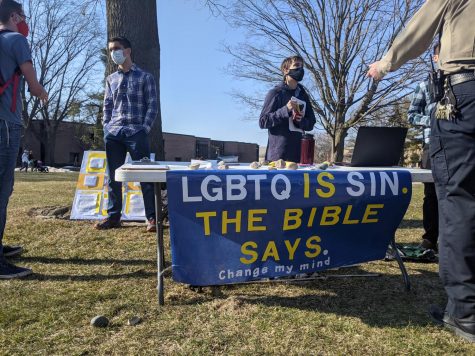
“I was told that we could chalk the campus, but we could only chalk ‘general messages of love’ that could be seen as benefitting anybody instead of just the queer community,” said Colburn. “… Having to tell queer students that when they felt like their specific community had just been attacked really tore me apart.”
To some LGBTQ+ students on campus, it feels like Calvin peddles a similar message of love to prospective students when it comes to issues of human sexuality. What they find once they’re enrolled and living on campus can sometimes be surprising.
“I think the picture that’s painted of the way LGBTQ+ students are treated on campus is not accurate, and I’d rather they’d just say that,” Nicole Sweda, the queer Center for Social Research employee whose marriage motivated Calvin’s split with the institute, told Chimes in March. “I would not have come to Calvin if I knew the kinds of things that were going to happen to me and what was going on. And I don’t think other people would, either.”
Jan Simonson felt similarly, expressing frustration over what she saw as efforts to veil the university’s policies against same-sex marriage to avoid negative publicity.
“They’re not willing to stand by it. They’re not willing to come out in public and say, ‘That’s our policy.’ But they paid people off to be quiet,” said Simonson, referring to the confidentiality agreements Calvin includes in many severance packages. Unlike other employees who were fired, Simonson felt comfortable speaking openly about her experience since her lawyer told her the confidentiality agreement she signed would be unlikely to hold up in court.
Calvin’s current provost doesn’t see the university’s policies against same-sex marriage as being in any way concealed. “The university’s positions and policies have existed for some time. They are clearly stated expectations for everyone who chooses to join this institution and community, and we seek to enforce them with consistency when there are known violations,” said Toly. “Synod’s upcoming deliberations have not changed the university’s policies, nor would enforcement of these policies either relax or become more restrictive in anticipation of Synod’s deliberations.”
However, not every employee feels as comfortable executing and defending the university’s policies on same-sex marriage. For some, like Hoekema, it’s a tough but necessary part of the job. For others, like Colburn, it’s simply too much to ask.





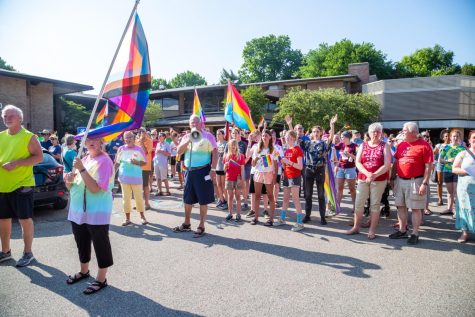
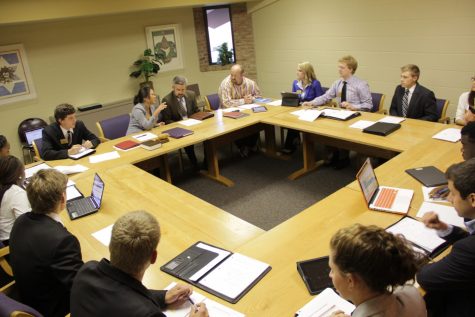
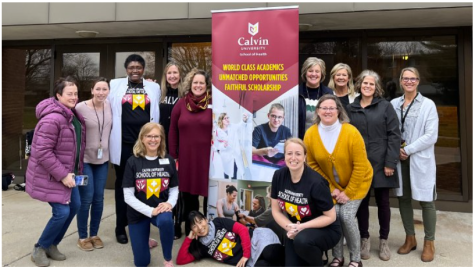
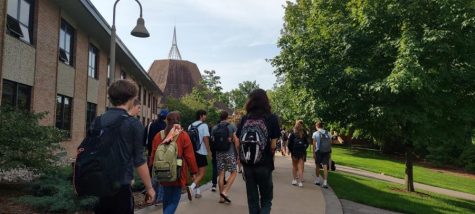

Joohn • Apr 22, 2022 at 5:09 pm
The doctrine of homosexuality is enshrined in a cultural bias expressed in Paul’s writings. Other such biases (for example, the role of women and slavery) are tempered by recent social developments, but doctrines on homosexuality are still promoted despite the damage they cause. We see more than first century philosophers (and the church leaders who set the canon) that sexual identity is a trait, not a choice. However, willfully blinded to the damage such an assumption causes, the doctrine goes unquestioned. It’s unbelievable.
Mariah • Apr 12, 2022 at 9:38 pm
To everyone involved in telling the stories of these folks who needed a voice, thank you. I am a Calvin alum, I am queer, and Jan Simonson is my mother. This article is such a small step towards real equity but after so many years of silence it’s also incredibly validating and healing. I am so proud of my mom for having the courage to live her truth and to tell her story. I wasn’t able to come out when I was at Calvin. I didn’t feel safe to be my whole self there. My mom is a trail blazer and I hope that what she shared inspires real change. Being queer isn’t sinful or harmful. Attempting to silence and marginalize someone because you are afraid of their difference causes actual and lasting harm. Sending so much care to the folks who are still looking for a safe space to be their full and beautiful selves. You deserve to be seen and heard. There is a whole world out here waiting for you to step into your truth and share your unique magic.
Paul Spyksma • Apr 12, 2022 at 4:35 pm
A more accurate summary of Calvin’s summary, far more accurate than “Hate the sin love the sinner,” would be ‘Pandering to bigots..”
Marc • Apr 12, 2022 at 1:49 am
Funny how it always takes someone from your own family coming out to force folks to re-evaluate their own beliefs. I am hopeful that the next generations are more tolerant toward the LGBTQ+ community.
There was a time when Calvin taught creationism. There was a time when the CRC fought against racial integration. There was a time when the churches spit over preaching in a language other than Dutch.
Get over it.
Randy Buist • Apr 11, 2022 at 10:37 pm
As a ’91 graduate, and as one whose life was significantly shaped in my years at Calvin, the past 10+ years have been painful to witness. Beginning with Byker’s misuse of funds to the rigid decisions of the outgoing administration, alumni are waiting to see real changes. Including all people as equally valued, regardless of gender identity, would be a great start. Yet, the denomination, the board, nor the admin have had the courage to live into the accepting ways of Jesus.
For those who want to hold onto traditions, remember what Jesus said to the rich young ruler about wealth and power? Yet, the DeVos family & others with great wealth seem to remain celebrities in the eyes of the power players at Calvin.
There are real reasons that the size of the student body continues to decline. In reality, Hope nor Kalamazoo are making similar same excuses.
To The Chimes staff, your courage speaks of your character.
Trevor • Apr 11, 2022 at 12:24 pm
Calvin Chimes has been noteworthy in its reporting of these issues within the last few months. So it’s such a disappointment to see such a clearly biased and agenda-driven article. Can this be marked more clearly as editorial?
I, personally, applaud Noah Toly and others in Calvin’s leadership for their commitment to Calvin’s current biblically-driven position that LGBT+ behavior is sin. Harm Venhuizen may not like it, but Calvin isn’t the only Christian university and the CRCNA isn’t the only denomination. Anyone who disagrees with Jesus’s teachings on sexuality and marriage are free to find places that affirm their personal beliefs.
Jan Simonson • Apr 12, 2022 at 11:52 am
Jesus never mentions homosexuality or same sex relationships.
Trevor • Apr 13, 2022 at 10:12 am
Natsun, I appreciate your thoughtful response.
Jan,
Jesus speaks specifically about one-man one-woman marriage in Matthew 19. Jesus speaks out against Sexual Immorality in Matthew 15.
But also, Reformed Christians believe that the Holy Spirit speaks the very words of Christ to us through the entire Christian Bible. Jesus Himself promised that the Holy Spirit would do so! Therefore when Paul affirms the sinfulness of homosexuality, those are the Words of Jesus and the Triune God through Paul.
Jesus is God and the three persons of the Trinity are in complete agreement at every point. Reformed are not “red letter Christians”, but believe in all Scripture (2 Tim. 3:16).
Jan Simonson • Apr 14, 2022 at 11:05 am
Assuming that Reformed women are silent in church and cover their heads…and I could go on, but do not want to argue. We both must follow scholars and the guidance of the Holy Spirit in us to deal with controversial Scripture verses.
Trevor • Apr 15, 2022 at 4:51 pm
What controversial Scripture passages? The passages repaying to human sexuality and LGBT+ have been clear and consistently understood for 2000 years, not including the old testament.
No reputable scholar claims the Bible allows for homosexual behavior.
The CRCNA, to which Calvin belongs, has consistently held to the sinfulness of homosexual behavior, despite 50 years of studying the topic.
All that’s left is deciding whether you want to love Christ by obeying His commandments (John 14:15) or defy your only savior.
Natsun Eisen '14 • Apr 13, 2022 at 12:43 am
This article was clearly written with a strong bias, but I think it’s still impressively balanced reporting nevertheless. I have a hair-trigger sensitivity to biased reporting and I still found this article informative and believe I am better for having read it.
I say that despite not sharing Venhuizen’s bias (I’m entirely not sure where I fall on the issue, actually, but I am definitely not in the “advocacy” camp at present).
I think Venhuizen’s article does an excellent job of sharing many voices on the issue, albeit far more from one side. Still, as someone with their mind not made up on the relevant issue, I found it impactful to read some of the perspectives contained in the article’s quotations. In particular, the Colburn quotations were especially meaningful in providing insight into the human experience of the situation for those within the LGBTQ+ community.
Of course, I also very much hope that future reporting makes some more space for perspectives and voices that might provide additional insight into how people in the Calvin community who are uncomfortable with just tossing out sections of the Bible are approaching the issue, as well as some more explanation from “official” Calvin spokespersons regarding the issue.
Kathy Wyant • Apr 22, 2022 at 7:16 pm
I understand your point, and I struggle with Scripture references about this matter. Looking up historical context can help understand the reasons other faithful Christians interpret those passages differently, though. I’d always wondered about the Deuteronomy 22:5 prohibition of cross-dressing, but I recently learned that ancient fertility worship (think of Baal and Asherah) involved sex with women wearing armor and men dressing as women .Our adult Sunday school class recently learned that ancient Romans also performed sexual worship activities (with female and male shrine prostitutes). Some Christians, therefore, believe that the Biblical prohibition against non-heterosexual sexual activity related only to God’s prohibition against idol worship, not against all LGBTQ+ relationships. Others believe it refers only to non-consensual sex.
Helen Groothuis • Apr 11, 2022 at 11:06 am
Chimes, if anyone is truly doing the Lord’s work on this campus, it is all of you. Thank you for your reporting and your advocacy. As a bisexual alumni (2017) now living in the UK, many have asked why I still care about what goes on at Calvin five years later. It’s because of things like this. I remember what it was like to be a queer student and not feel welcome, and it depends on people like us to advocate for the students who are there now. I will likely publicly tell me story in future, but definitely still need to put my thoughts together. This campus is lucky to have such an exceptional team holding the administration to account.